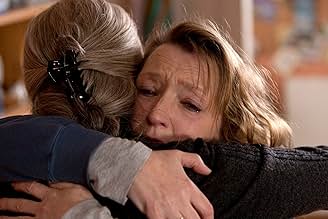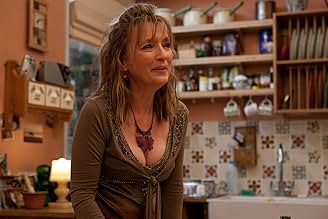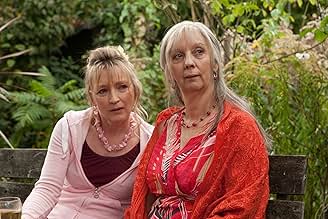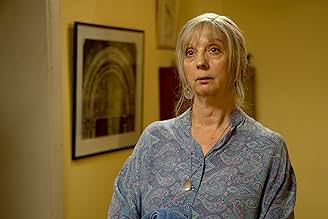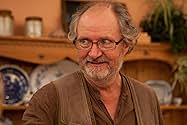AVALIAÇÃO DA IMDb
7,4/10
32 mil
SUA AVALIAÇÃO
Uma análise das quatro estações da vida de um casal feliz e seus relacionamentos com a família e amigos.Uma análise das quatro estações da vida de um casal feliz e seus relacionamentos com a família e amigos.Uma análise das quatro estações da vida de um casal feliz e seus relacionamentos com a família e amigos.
- Direção
- Roteirista
- Artistas
- Indicado a 1 Oscar
- 23 vitórias e 57 indicações no total
Avaliações em destaque
In Mike Leigh's new slice of life, Another Year, a married couple who have managed to remain blissfully happy into their crumbling autumn days are surrounded over the course of the four seasons of one seemingly average year by friends, colleagues, and family, many of whom appear to suffer some degree of unhappiness or at least confusion. The film is nicely segmented into chapters, following the seasons. All of life is there - from birth, to a funeral. Strangely, or conveniently, given the apparently troubled lives all round, She works as a psychotherapist, while He builds things, but both spend their spare time together growing vegetables in their allotment. Mary, the secretary in her clinic, takes over the centre of the story as she gradually moves into more of everyone's lives. Or perhaps it's just that the film gradually opens up the relationship that was already there. Just as it is with all the extra characters. As it's a Mike Leigh film, all the actors will all have been living "in character" for maybe six months before breezing through, stirring up the plot with their back story and emotional infrastructure.
Lesley Manville, as Mary, the lonely and unstable girl of a certain age - 40, going on 17, really steals this in the final part, which gets even more intense than the rest of it. One thing I noticed right away was that adding to the intensity of the Mike Leigh close-ups, it's all shot in high-definition digital. But in the end it's the total effect that works. The apparent non-acting. The marvellous thing about Leigh is the way he shows really ordinary people doing really ordinary things and makes them really important. He is so compassionate towards everyone in his stories. You just can't help caring, too.
Lesley Manville, as Mary, the lonely and unstable girl of a certain age - 40, going on 17, really steals this in the final part, which gets even more intense than the rest of it. One thing I noticed right away was that adding to the intensity of the Mike Leigh close-ups, it's all shot in high-definition digital. But in the end it's the total effect that works. The apparent non-acting. The marvellous thing about Leigh is the way he shows really ordinary people doing really ordinary things and makes them really important. He is so compassionate towards everyone in his stories. You just can't help caring, too.
Tom and Gerri (Jim Broadbent and Ruth Sheen), the couple at the centre of Mike Leigh's latest existential piece, couldn't be more unlike the cartoon characters who share their names. Together for several decades, their love for each other has only grown. I wouldn't complain if my marriage looked like theirs when I'm in my 50s.
When he isn't working as a geologist and she isn't counselling people, they spend their time providing solace to those who need it – Ken (Peter Wight), a straight-talking, John Smiths-drinking Yorkshireman; Ronnie (David Bradley), Tom's laconic brother whose wife has just died; and most of all Mary (Lesley Manville), a jittery colleague of Gerri's in the middle of a mid-life crisis. It is Mary who dominates the film and who most elicits our empathy. She is without love and possibly even without the hope of love. It is genuinely painful to see her disintegrate scene by scene.
As another year in Tom and Gerri's life unfolds, we see nothing particularly fascinating happen. They tend to their allotment, they invite people to their house for food and company, and they reminisce about their experiences. Nothing could be more trivial, right? Wrong. This film is about growing old and making the right choices as one gets to old age. Above all it's about recognising that happiness is less a right than an aspiration.
The word 'integrity' comes to mind when I think of Mike Leigh. Who else could convince actors to sign up to films where there was no script to begin with? Throughout his career he has eschewed the Hollywood system and has done things his own way ('Given the choice of Hollywood or poking steel pins in my eyes, I'd prefer steel pins').
An audience member expostulated at the end, 'That wasn't very uplifting'. She's correct, but Leigh doesn't offer folly or fantasy. He's a truth-seeking social observer and commentator. What's also appealing about Leigh is that he doesn't spoon-feed his audience. His films compel the watcher to debate what they have seen and draw their own conclusions. Why should films give us answers?
I was moved by this film like no other in recent memory. One moment I was laughing uncontrollably, the next I was holding back tears. The film emphasises a sad fact: for some people, things don't always go according to plan. Sometimes we're just plain unlucky. And that's life.
www.scottishreview.net
When he isn't working as a geologist and she isn't counselling people, they spend their time providing solace to those who need it – Ken (Peter Wight), a straight-talking, John Smiths-drinking Yorkshireman; Ronnie (David Bradley), Tom's laconic brother whose wife has just died; and most of all Mary (Lesley Manville), a jittery colleague of Gerri's in the middle of a mid-life crisis. It is Mary who dominates the film and who most elicits our empathy. She is without love and possibly even without the hope of love. It is genuinely painful to see her disintegrate scene by scene.
As another year in Tom and Gerri's life unfolds, we see nothing particularly fascinating happen. They tend to their allotment, they invite people to their house for food and company, and they reminisce about their experiences. Nothing could be more trivial, right? Wrong. This film is about growing old and making the right choices as one gets to old age. Above all it's about recognising that happiness is less a right than an aspiration.
The word 'integrity' comes to mind when I think of Mike Leigh. Who else could convince actors to sign up to films where there was no script to begin with? Throughout his career he has eschewed the Hollywood system and has done things his own way ('Given the choice of Hollywood or poking steel pins in my eyes, I'd prefer steel pins').
An audience member expostulated at the end, 'That wasn't very uplifting'. She's correct, but Leigh doesn't offer folly or fantasy. He's a truth-seeking social observer and commentator. What's also appealing about Leigh is that he doesn't spoon-feed his audience. His films compel the watcher to debate what they have seen and draw their own conclusions. Why should films give us answers?
I was moved by this film like no other in recent memory. One moment I was laughing uncontrollably, the next I was holding back tears. The film emphasises a sad fact: for some people, things don't always go according to plan. Sometimes we're just plain unlucky. And that's life.
www.scottishreview.net
Mike Leighs wonderfully ironic yet sweet look at life takes a little twist in this super ensemble movie which centers around Tom and Gerri and shows us these characters mainly as reflected by their friends and kin. What makes the twist is something written in a different review and which is apparently a Continental European viewpoint if I must believe Mr. Leigh. The minor flaw of this film is that Tom and Gerri hardly develop and if they do, it really is downwards as - when you leave the theatre - you are left with some questions as to whether they really are as warm and supportive as they appear prima facie. Why are all their friends alcoholic losers? And why are they so supportive, yet so aloof? We found a few scenes that show how Tom and Gerri feel about Mary (a shoe-in for any award because of the slightly over-the-top, nail biter performance by Lesley Manville). Their friends really make them feel better about themselves. Whatever may be of this Continental take, it is a tremendously enjoyable movie, as always.
I have heard a lot o buzz surrounding Another Year, and it is one of the last Oscar-nominated films I had yet to see. So I had a chance to watch it today, not knowing what type of film it would be since I have not seen other Mike Leigh films. It engaged me from it's opening scene to the last.
This is a masterful film, dwelling with it's characters in truly humane and intriguing ways. This is an ensemble cast, and as a whole they were all great. Jim Broadbent and Ruth Sheen are at the center of the film, and the film takes us on a portrayal of their relationship with others. It is to note that the film is contrasting just how different these two main characters' approach life than the people they are surrounded by. The most notable to these other characters is Mary, played by Lesley Manville. I have to say that she gives one of the best performances of 2010, becoming her character. She is vulnerable and at the same time delusional as to her fantasies in life. It's hard to label her performance as leading or supporting. She has a large amount of screen time, but at the same time she serves only as a window looking in to both Sheen and Broadbent's life. She has definitely created one of the most memorable characters in recent memory, and thats largely because of amazing direction and perhaps the best original screenplay of 2010.
Even when Manville is placed in supporting, it is a shame that the Academy went for a more popular actress (Melissa Leo) when Manville and Weaver (Animal Kingdom) both are amazingly much more effective and either deserved to take home that Oscar (what blasphemy that Manville wasn't even nominated). However, this is a rich film, and certainly one of the best of 2010.
This is a masterful film, dwelling with it's characters in truly humane and intriguing ways. This is an ensemble cast, and as a whole they were all great. Jim Broadbent and Ruth Sheen are at the center of the film, and the film takes us on a portrayal of their relationship with others. It is to note that the film is contrasting just how different these two main characters' approach life than the people they are surrounded by. The most notable to these other characters is Mary, played by Lesley Manville. I have to say that she gives one of the best performances of 2010, becoming her character. She is vulnerable and at the same time delusional as to her fantasies in life. It's hard to label her performance as leading or supporting. She has a large amount of screen time, but at the same time she serves only as a window looking in to both Sheen and Broadbent's life. She has definitely created one of the most memorable characters in recent memory, and thats largely because of amazing direction and perhaps the best original screenplay of 2010.
Even when Manville is placed in supporting, it is a shame that the Academy went for a more popular actress (Melissa Leo) when Manville and Weaver (Animal Kingdom) both are amazingly much more effective and either deserved to take home that Oscar (what blasphemy that Manville wasn't even nominated). However, this is a rich film, and certainly one of the best of 2010.
Mike Leigh's latest film Another Year follows the story of a happily married couple approaching their retirement years. Their warm relationship offers them security as the the film progresses. Their friends and family, by contrast, all struggle to some extent with unhappiness, and a sense that their best years may be behind them.
The film is a story of ageing; the small events that can make life either comforting or unbearable; and the refuge that companionship can offer.
Rut Sheen's role as Gerri is superb. Her open, welcoming face invites her friend and colleague Mary (played by Lesley Manville) to open up to her about her drunken fears of where her life is leading. Jim Broadbent's Tom is charming and self-effacing, confident in his own happiness yet nonplussed at the failure of his friend Ken – Peter Wight – to come to terms with growing old.
The film dwells on the small, predominantly non-verbal signals that reveal emotional and social insecurity. Leigh's direction reminds us that the sharpest insights into character lie in moments where we think we at our most concealed. Faces betray what we wish were kept private – at moments where verbal communication fails, physical expression lights up hidden fears, passions, failings and desires.
Leigh treats all his characters with a certain dignity – whilst there are moments where we are encouraged to laugh at their social inadequacies, for the most part we suffer along with them, knowing that their experiences are all too near reality to take lightly. We encourage Tom and Gerri to keep supporting their despairing friends, yet knowing at the same time that their married happiness can only serve to mock their friends' lonely lives further. The four strictly partitioned seasons of the film point towards a growing anxiety that it may in fact be too late for these lost characters. The cyclical nature of the structure suggests that there is no real remedy for those left unloved and lonely at the film's conclusion.
From the opening scene, where a woman silently struggles to recollect the happiest moment in her life, to the point when the dialogue slowly fades away to leave Mary isolated and forlorn, we cannot help but be both enchanted and dismayed by the emotional honesty of Mike Leigh's characters. This is what sets out the director as a truly gifted artist – his ability to heighten the routine into the dramatic; and to make the trivial, truly tragic.
The film is a story of ageing; the small events that can make life either comforting or unbearable; and the refuge that companionship can offer.
Rut Sheen's role as Gerri is superb. Her open, welcoming face invites her friend and colleague Mary (played by Lesley Manville) to open up to her about her drunken fears of where her life is leading. Jim Broadbent's Tom is charming and self-effacing, confident in his own happiness yet nonplussed at the failure of his friend Ken – Peter Wight – to come to terms with growing old.
The film dwells on the small, predominantly non-verbal signals that reveal emotional and social insecurity. Leigh's direction reminds us that the sharpest insights into character lie in moments where we think we at our most concealed. Faces betray what we wish were kept private – at moments where verbal communication fails, physical expression lights up hidden fears, passions, failings and desires.
Leigh treats all his characters with a certain dignity – whilst there are moments where we are encouraged to laugh at their social inadequacies, for the most part we suffer along with them, knowing that their experiences are all too near reality to take lightly. We encourage Tom and Gerri to keep supporting their despairing friends, yet knowing at the same time that their married happiness can only serve to mock their friends' lonely lives further. The four strictly partitioned seasons of the film point towards a growing anxiety that it may in fact be too late for these lost characters. The cyclical nature of the structure suggests that there is no real remedy for those left unloved and lonely at the film's conclusion.
From the opening scene, where a woman silently struggles to recollect the happiest moment in her life, to the point when the dialogue slowly fades away to leave Mary isolated and forlorn, we cannot help but be both enchanted and dismayed by the emotional honesty of Mike Leigh's characters. This is what sets out the director as a truly gifted artist – his ability to heighten the routine into the dramatic; and to make the trivial, truly tragic.
Você sabia?
- CuriosidadesTo simulate the four seasons of a year, cinematographer Dick Pope used four different film stocks, and much attention was paid to details in the props so that the passage of time would appear believable.
- Erros de gravaçãoOne of Mary's outlays on her troublesome car was for a new carburettor, but the vehicle in the film had fuel injection.
- ConexõesFeatured in At the Movies: Cannes Film Festival 2010 (2010)
- Trilhas sonorasAll Shook Up
Written by Elvis Presley & Otis Blackwell
Used by kind permission of Carlin Music Corp & EMI Publishing
Principais escolhas
Faça login para avaliar e ver a lista de recomendações personalizadas
- How long is Another Year?Fornecido pela Alexa
Detalhes
Bilheteria
- Orçamento
- US$ 8.000.000 (estimativa)
- Faturamento bruto nos EUA e Canadá
- US$ 3.205.706
- Fim de semana de estreia nos EUA e Canadá
- US$ 111.869
- 2 de jan. de 2011
- Faturamento bruto mundial
- US$ 19.722.766
- Tempo de duração
- 2 h 9 min(129 min)
- Cor
- Mixagem de som
- Proporção
- 2.35 : 1
Contribua para esta página
Sugerir uma alteração ou adicionar conteúdo ausente








